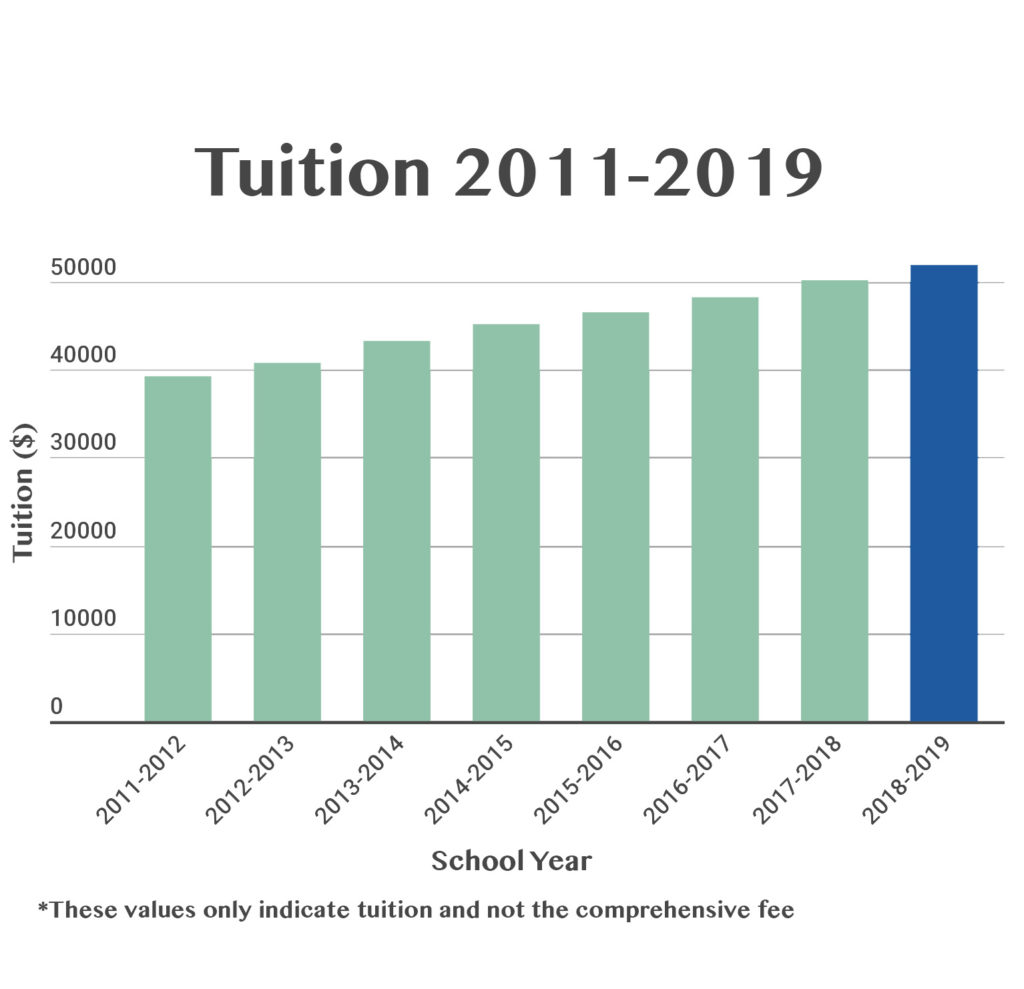On Jan. 10, a campus memo was sent out to Grinnell College students announcing the tuition and Comprehensive Fee Increase for the 2018-19 academic year. This notice sent by President Kington outlined a 3.31 percent increase in the total comprehensive fee, from $63,114 to $65,202.
The comprehensive fee for each year is a result of discussion between the president, treasurer, vice president for enrollment and associate vice president of financial aid, said Nancy Combs, interim chief financial officer, controller and assistant treasurer in an email to The S&B. Several scenarios are drawn up to reflect a variety of financial factors which are sent to the Board of Trustees Finance Committee for review and then passed along to the full Board for approval.
“The 3.31 percent increase in the comprehensive fee for 2018-19 is the second lowest percentage increase in the last five years,” said Patricia Finkelman, a Life Trustee, in an email to The S&B, adding that “future increases in the comprehensive fee will be kept to the minimum required to fulfill our mission and maintain the quality of the Grinnell educational experience.”
Finkelman also pointed out that the 3.3 percent increase is less than the Higher Education Price Index increase of 3.7 percent, which is a measurement of national changes in primary costs of higher education institutions such as staff and faculty salaries and utilities.
Additionally, Finkelman stressed that President Trump’s new tax plan was not a factor in determining the comprehensive fee for 2018-19. Combs elaborated, stating, “There was no interest in raising the comprehensive fee as a way to offset the impact of the new endowment tax. It is our intent to cover the cost of the tax through other options. It’s worth noting that the rules determining calculation of the new endowment tax are still being defined. We are watching the situation carefully. In the meantime, the Investment Office has modeled the potential cost of the new tax to help us prepare for and cover the impact of the tax in the operating budget.”

From an admissions perspective, the increase in tuition raises the question of how prospective students will react.
“All top-tier national liberal arts colleges charge a comprehensive fee of more than $60,000 per year (and pay more than that to educate students),” explained Joe Bagnoli, vice president for enrollment and dean of admission and financial aid. “Many have not yet set their fees for next year but after fees for our benchmark institutions — schools we refer to internally as the “Peer 16” — were set last year, Grinnell’s total comprehensive fee ranked 15th. The average increase at these institutions last year was 3.8 percent. Grinnell’s increase for next year, by comparison, is lower than recent increases at peer institutions.”
Combs seconded this, stating that Grinnell’s comprehensive fee is also amongst the lowest of its peer institutions.
“As comprehensive fee increases, maintaining financial accessibility for Grinnell students remains a top priority for the college,” Brad Lindberg, assistant vice president of enrollment and director of financial aid, wrote in an email to The S&B.
Upon initial announcement of the increase, many students may have questioned the impact this would have on their financial aid awards.
“Our need-based financial aid program is designed to respond to yearly increases in comprehensive fee as well as changes to family circumstances,” Lindberg said. “Families who do not experience significant financial changes from year to year can expect a consistent financial aid package, adjusted upwards for cost increases, over each of their four years at Grinnell.”
Lindberg also urged students or families to contact the financial aid office with any questions, reaffirming their commitment to ensuring that they have all necessary information to provide an appropriate financial aid package to each student based on their family’s circumstance.
“It is also important to note that through the careful stewardship of our resources, including our endowment, and the generosity of our donors, we are able to keep our comprehensive fee significantly lower than our actual operating costs,” Kington reassured students in his special campus memo.
According to Bagnoli, the operating costs for 2018-19 will exceed $80,000 per student, meaning that no student at Grinnell pays full price, or that “even those who pay the full comprehensive fee, therefore, receive a substantial gift from Grinnell College.” Operating costs include paying faculty and staff and maintaining facilities, while the comprehensive fee is “the portion of our costs we assign to students and their families.”
“We trust that prospective students and their parents (and current students) will find the substantial value of a Grinnell education to be worth what they are required to pay for it,” Bagnoli stressed.



























































bob • Feb 8, 2018 at 8:42 pm
When I started Grinnell in 77 tuition was about 3K, when I finished in 81 it was about 8K